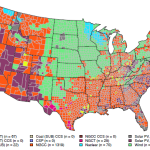ISO-NE Acquires Low-Priced, Surplus Capacity Last Monday, ISO New England’s annual Forward Capacity Auction (FCA) for 2020-2021 yielded low capacity prices. ISO-NE, the New England electricity grid operator, holds FCAs three years in advance to ensure that the grid has sufficient resources to meet electricity demand. In past years, the clearing prices have been quite….
MA Issues New Clean Air Regulations to Reduce Greenhouse Gas Emissions
Massachusetts Governor Charlie Baker’s Department of Environmental Protection has drafted a new clear air regulations proposal. The proposal would aim to reduce greenhouse gas emissions further after MA’s Supreme Court ruled the state was not doing enough to cut them. Under the proposal, utilities would have to purchase generation credits from zero-carbon sources at 16….
Are Renewables Trending Upward?

The University of Texas Austin’s Energy Institute recently published an interactive map that reflects the country’s movement away from coal. It illustrates what kinds of power plants are cheapest to build in every county in the continental United States. For most of the country, the lowest-cost plants are natural gas combined cycle plants (in red),….
MA Business Confidence Highest Since 2004
This December, the Associated Industries of Massachusetts Business Confidence Index (BCI) hit its highest level since December 2004. The BCI rose 2.3 points from 58.1 to 60.4 last month, a figure that has experienced increases in the Commonwealth in each of the last four months. It is also 5.1 points higher than it was in….
SREC II Qualification Application Deadline Imminent
Applicants that wish to attain or retain their SREC II qualification must meet certain requirements depending on their system size and status by Sunday, January 8, 2017. The DOER released the following requirements for systems over 25 kW and under or equal to 25 kW to meet qualification. Please visit these requirements for all required….
FERC Proposal to Better Integrate Energy Storage and Distribution into Markets
The Federal Energy Regulatory Commission (FERC) recently issued a Notice of Proposed Rulemaking (NOPR) that would require Regional Transmission Organizations (RTOs) to allow 100 kW of energy storage and distributed energy resources. In addition to breaking down barriers to both energy storage and distributed energy resources, the notice would permit RTOs to participate in capacity,….
Canada to Eliminate Coal by 2030
Catherine McKenna, Canada’s Minister of Environment and Climate Change of Canada, announced that Canada aims to eliminate traditional coal power by 2030. The announcement comes on the heels of country’s plan to reduce greenhouse-gas emissions by 30 percent from 2005 levels by 2030. The country is also set to introduce a carbon levy starting in….
Michigan Approves Energy Bills
This past week, the Michigan Senate passed two energy bills. The first, energy choice bill SB 437, passed by a 26-10 vote and would limit retail choice providers that supply 10 percent of Michigan’s electricity customers. Currently, 10 percent of customers can use a third-party electricity supplier instead of the utility. In addition, the mandate….
Nevada Votes “Yes” on Electricity Deregulation
Yesterday, Nevadans voted to amend the state’s constitution and initiate legislature that would open a competitive electricity energy market. Currently, the Nevada Public Utilities Commission regulates utility rates and utilities are allowed to establish monopolies based on their respective service areas. The legislature would get rid of the present monopoly system. Under the legislature, “every….
Nevada to Vote on Electricity Deregulation
A proposal on the November 8 ballot will give Nevada voters the chance to open a competitive electricity energy market. A “yes” vote on Question 3 would initiate a replacement of the present monopoly system. Under this legislation, utilities would still charge for the delivery of electricity, but customers could buy their electricity supply. Currently,….
- «Previous Page
- 1
- …
- 10
- 11
- 12
- 13
- 14
- …
- 19
- Next Page»